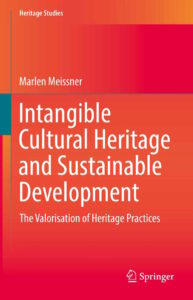
Marlen Meissner, 2021
Auf der Grundlage des Ansatzes von Pierre Bourdieu zur „Theorie der Praxis“ werden in diesem Buch die Entwicklungspotenziale des immateriellen Kulturerbes – ausformuliert in der 2003er-Konvention – diskutiert und reflektiert. Die Konvention interpretiert immaterielles Erbe als Motor (‚driver‘) und Wegbereiter (‚enabler‘) für Entwicklung, dem wiederum Paradigmen von nachhaltiger Entwicklung und menschlicher Entwicklung zu Grunde liegen. Dies beinhaltet, dass immaterielle Kulturpraktiken sowohl Potenziale für wachstumsbasierte nachhaltige Entwicklung, z.B. in Form von Kulturindustrien oder Tourismus, als auch für menschliche Entwicklung im weitesten Sinne in sich bergen. Die Publikation systematisiert die Entwicklungspotenziale von immateriellem Erbe, um deren aktive Inwertsetzung zu unterstützen. Der theoretische Zugang wird mit einer empirischen Fallstudie zum „Finsterwalder Sängerfest” ergänzt, das auf einer Tradition des Chorsingens basiert. Zentrales Ergebnis der Untersuchung ist ein Modell zur Inwertsetzung von Erbepraktiken, das den Zusammenhang von immateriellem Erbe mit nachhaltiger und menschlicher Entwicklung aufzeigt. Das Modell veranschaulicht darüber hinaus, wie die Ziele des 2003er-Übereinkommens auch jenseits einer UNESCO-Nominierung umgesetzt werden können.
Schlüsselbegriffe: Kulturelles Kapital, kulturelle Identität, Inwertsetzung von Erbe, immaterielles Kulturerbe, mimetische Prozesse, Musikerbe, Pierre Bourdieu, nachhaltige Entwicklung, implizites Wissen, UNESCO und immaterielles Kulturerbe, identitätsstiftendes Potential von Erbepraktiken, Erbepraktiken zur Erzeugung sozialer und ökonomischer Gewinne, Entwicklungspotentiale von Erbe auf Praxisebene, Inwertsetzungsmodell, deutsche Chortradition, Konvention zur Bewahrung des immateriellen Kulturerbes.
Download: Flyer
Veröffentlicht: 2021
Das Buch bei springer.de: https://www.springer.com/book/9783030799373
Die vollständige Serie “Heritage Studies Series“ auf springer.de.
INHALT / TABLE OF CONTENTS
-
- Introduction
- The 2003 Convention in the Context of Sustainable Development
- Off to New Shores: From Tangible to Intangible and Sustainable
- Intangible Cultural Heritage and Sustainable Development: Retracing a Vague Relationship
- Sustainable Development in the ‘Operational Directives for the Implementation of the Convention for the Safeguarding of the Intangible Cultural Heritage’
- Intangible Cultural Heritage and Social Sustainability
- Intangible Cultural Heritage and Economic Sustainability
- Intangible Cultural Heritage and Environmental Sustainability
- Intangible Cultural Heritage and Peacebuilding
- Heritage Practices and Development: State of the Art
- Pierre Bourdieu’s ‘Theory of Practice’
- Bourdieu’s ‘Theory of Practice’: Background and Application
- ‘Subjectivist’ Influences
- ‘Objectivist’ Influences
- Overcoming the Opposition Between ‘Subjectivism’ and ‘Objectivism’
- Bourdieu’s Concept of the Habitus
- The Historicity and the Hysteresis of the Habitus
- Unconscious Incorporation of the Habitus
- Class Versus Field
- Cultural Practices as Mirrors of Social Structures
- The Forms of Capital
- Economic Capital
- Social Capital
- Cultural Capital
- Symbolic Capital
- Capital
- Contemporary Reception and Criticism
- Bourdieu’s ‘Theory of Practice’: Background and Application
- Intangible Cultural Heritage in the Light of Bourdieu’s ‘Theory of Practice’
-
- Case Study: The Finsterwalder Sängerfest
- History of the Finsterwalder Sängerfest
- The Finsterwalder Sängerfest 2016
- Contents of the Questionnaire
- Results of the Questionnaire and Procession of Data
- Intangible Cultural Heritage as Cultural Capital
- Intangible Cultural Heritage as Incorporated Cultural Capital
- Intangible Cultural Heritage as Objectified Cultural Capital
- Intangible Cultural Heritage as Institutionalised Cultural Capital
- Case Study: The Finsterwalder Sängerfest
-
- The Valorisation of Intangible Cultural Heritage
-
-
-
- ‘Enabling’ Development: The Practice of ICH and the Formation of the Habitus
- ‘Driving’ Development: The Practice of ICH and Conversions of Capital
- The ‘Conversion’ of ICH Practices into ‘Social Capital’
- The ‘Conversion’ of ICH Practices into ‘Economic Capital’
- Model of ICH Valorisation
-
-
-
- Conclusion
Weitere Ausgaben aus der Reihe Heritage Studies
- Cultural Heritage Protection in Korea – Contents of Law and Policy and their Changes in Relation to International Conventions
- Handbook on Intangible Cultural Practices as Global Strategies for the Future
- Claiming Back Their Heritage: Indigenous Empowerment and Community Development through World Heritage
- Dance Practices as Research – Approaches to the Safeguarding and Transmission of the Intangible Cultural Heritage of Dance
- 50 Years World Heritage Convention: Shared Responsibility – Conflict & Reconciliation
- Ein Metamodel für Kulturerbe-basierte Stadtentwicklung – Aktivierung von nachhaltiger Entwicklung durch städtisches kulturelles Erbe
- The UNESCO Memory of the World Programme: Key Aspects and Recent Developments
- Going Beyond – Perceptions of Sustainability in Heritage Studies No. 2
- Perceptions of Sustainability in Heritage Studies
- 40 Jahre Welterbekonvention
- Understanding Heritage

Sie müssen angemeldet sein, um einen Kommentar zu veröffentlichen.